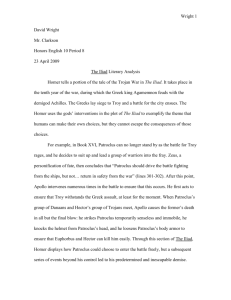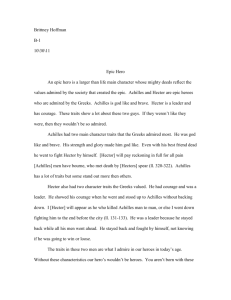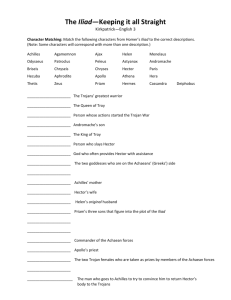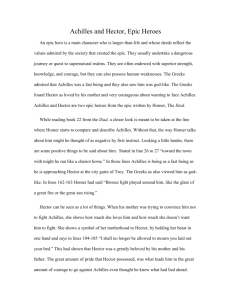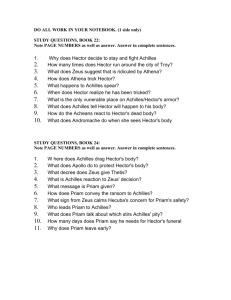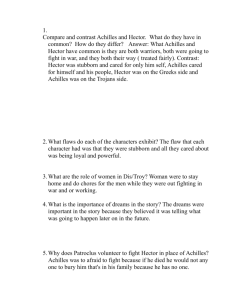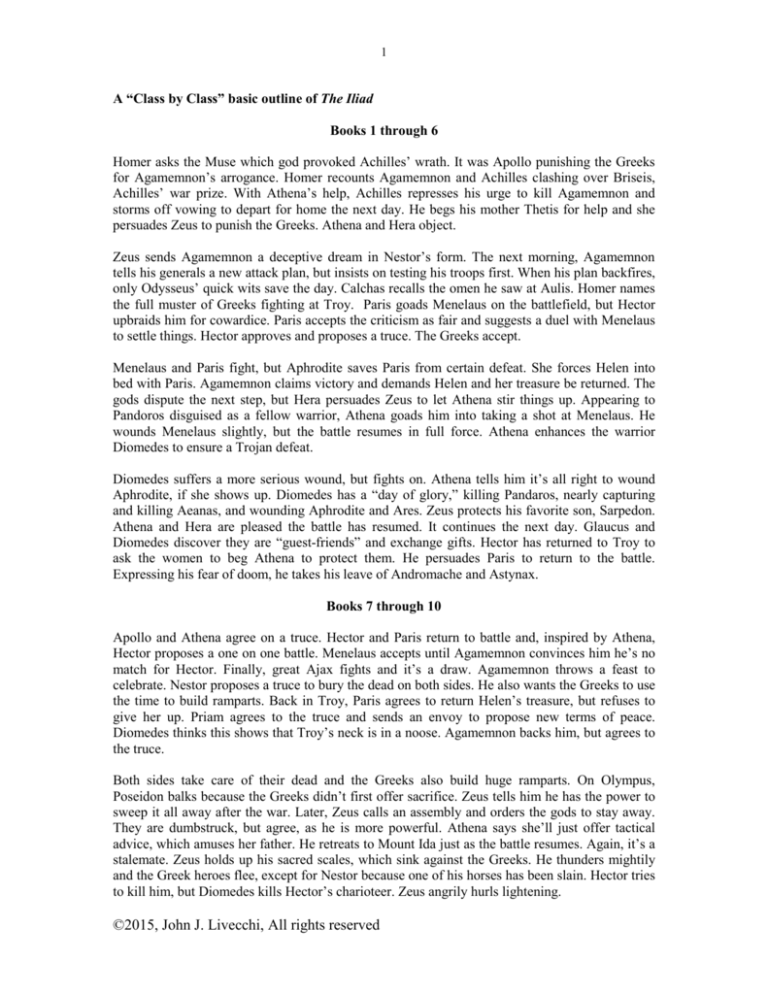
1
A “Class by Class” basic outline of The Iliad
Books 1 through 6
Homer asks the Muse which god provoked Achilles’ wrath. It was Apollo punishing the Greeks
for Agamemnon’s arrogance. Homer recounts Agamemnon and Achilles clashing over Briseis,
Achilles’ war prize. With Athena’s help, Achilles represses his urge to kill Agamemnon and
storms off vowing to depart for home the next day. He begs his mother Thetis for help and she
persuades Zeus to punish the Greeks. Athena and Hera object.
Zeus sends Agamemnon a deceptive dream in Nestor’s form. The next morning, Agamemnon
tells his generals a new attack plan, but insists on testing his troops first. When his plan backfires,
only Odysseus’ quick wits save the day. Calchas recalls the omen he saw at Aulis. Homer names
the full muster of Greeks fighting at Troy. Paris goads Menelaus on the battlefield, but Hector
upbraids him for cowardice. Paris accepts the criticism as fair and suggests a duel with Menelaus
to settle things. Hector approves and proposes a truce. The Greeks accept.
Menelaus and Paris fight, but Aphrodite saves Paris from certain defeat. She forces Helen into
bed with Paris. Agamemnon claims victory and demands Helen and her treasure be returned. The
gods dispute the next step, but Hera persuades Zeus to let Athena stir things up. Appearing to
Pandoros disguised as a fellow warrior, Athena goads him into taking a shot at Menelaus. He
wounds Menelaus slightly, but the battle resumes in full force. Athena enhances the warrior
Diomedes to ensure a Trojan defeat.
Diomedes suffers a more serious wound, but fights on. Athena tells him it’s all right to wound
Aphrodite, if she shows up. Diomedes has a “day of glory,” killing Pandaros, nearly capturing
and killing Aeanas, and wounding Aphrodite and Ares. Zeus protects his favorite son, Sarpedon.
Athena and Hera are pleased the battle has resumed. It continues the next day. Glaucus and
Diomedes discover they are “guest-friends” and exchange gifts. Hector has returned to Troy to
ask the women to beg Athena to protect them. He persuades Paris to return to the battle.
Expressing his fear of doom, he takes his leave of Andromache and Astynax.
Books 7 through 10
Apollo and Athena agree on a truce. Hector and Paris return to battle and, inspired by Athena,
Hector proposes a one on one battle. Menelaus accepts until Agamemnon convinces him he’s no
match for Hector. Finally, great Ajax fights and it’s a draw. Agamemnon throws a feast to
celebrate. Nestor proposes a truce to bury the dead on both sides. He also wants the Greeks to use
the time to build ramparts. Back in Troy, Paris agrees to return Helen’s treasure, but refuses to
give her up. Priam agrees to the truce and sends an envoy to propose new terms of peace.
Diomedes thinks this shows that Troy’s neck is in a noose. Agamemnon backs him, but agrees to
the truce.
Both sides take care of their dead and the Greeks also build huge ramparts. On Olympus,
Poseidon balks because the Greeks didn’t first offer sacrifice. Zeus tells him he has the power to
sweep it all away after the war. Later, Zeus calls an assembly and orders the gods to stay away.
They are dumbstruck, but agree, as he is more powerful. Athena says she’ll just offer tactical
advice, which amuses her father. He retreats to Mount Ida just as the battle resumes. Again, it’s a
stalemate. Zeus holds up his sacred scales, which sink against the Greeks. He thunders mightily
and the Greek heroes flee, except for Nestor because one of his horses has been slain. Hector tries
to kill him, but Diomedes kills Hector’s charioteer. Zeus angrily hurls lightening.
©2015, John J. Livecchi, All rights reserved
2
Nestor realizes Zeus is displeased and advises Diomedes to flee. Hector taunts him as he goes
and, when Zeus thunders again, Hector assumes the god’s support. Meanwhile Hera, livid her
Greeks are loosing, asks Poseidon to interfere. He refuses too afraid of Zeus’s power. Hera
inspires Agamemnon to stir his troops. He prays to Zeus, moving the god to pity. The Greeks
fight with renewed energy. Teucer has a moment of glory, killing many Trojans, except for
Hector who slays him. Hector continues advancing against the Greeks and the battle becomes a
rout. Athena and Hera intervene. Athena angrily recalls how she once helped Zeus’s favorite,
Heracles.
Zeus sends Iris to warn the gods away. They comply and he reveals his entire plan for the war’s
outcome. Back on the battlefields, the sun has set. Hector sets watch fires, determined to defeat
the Greeks the next day. The Greeks are in a panic and Agamemnon advises them to cut and run.
Diomedes berates his leader’s courage and Nestor tells Agamemnon to consult his generals
fearing mutiny. They all agree to try to appease Achilles, sending a delegation to his camp.
Achilles receives them graciously, but refuses their offer, but, moved by Ajax’s plain talk, he
leaves open one possibility—he’ll return if the Greeks ships are burned.
The delegation returns with the bad news. Diomedes inspires them to fight without Achilles.
Unable to sleep, Agamemnon decides to visit Nestor for advice, On the way, he runs into a
similarly worried Menelaus. He wonders who among the Geeks might be brave enough to spy on
the Trojans. Agamemnon sends his brother to get Ajax and Idomeneus and meet him at Nestor’s
tent. In the end, Diomedes heads up the expedition with Odysseus. Athena guides them across the
plain.
Meanwhile, Hector too is thinking about sending a spy. Dolon leaps to volunteer if his prize could
be Achilles’ horses and chariot. Hector agrees and Dolon takes off. Odysseus sees him coming
and the two Greeks head him off and ambush him. He lies to the pair, but the cool tactician is able
to get the truth out of him before killing him. Using information from Dolon, the two Greeks
ambush a Thracian camp, killing many of them and capturing their horses. The two return
victorious to the Greek camp where they offer a sacrifice to Athena.
Books 11 through 15
The next dawn, Eris resumes the battle with a mighty cry that even Achilles hears. Agamemnon
rises to arm himself for what will be his “day of glory.” The Greeks meet at the trench and attack.
Agamemnon leads an assault that breaks through the Trojan line. He advances, stripping men of
their armor as he slays them. Hector is drawn away and the Trojan retreat to the Scaean Gates.
Zeus sends Iris to tell Hector to stay out of the battle until Agamemnon is wounded. Homer
invites the muse to help him recall the fierce battle. Coon wounds Agamemnon while trying to
protect his brother’s body. Agamemnon slays him and fights on, though wounded, until the pain
becomes too fierce.
Hector sees Agamemnon’s retreat and tells the Trojans Zeus has handed them victory. Odysseus
calls to Diomedes for help. Though he fears Zeus might be helping the Trojans, Diomedes
throws a spear at Hector, which knocks him out. Diomedes is able to retrieve the spear, but when
Hector comes to, he taunts the hero. Meanwhile Paris shoots an arrow at Diomedes, wounding
him seriously. He taunts Paris to fight man to man. Odysseus aids him, but the hero yanks out the
arrow himself. The pain forces him from the battle, leaving Odysseus alone. He decides to brave
it out and attacks the Trojans like a wild boar. He wound several before Socus wounds him—not
seriously, as he enjoys Athena’s protection. Odysseus kills Socus. The Greeks see Odysseus’s
wounds and lead him away.
©2015, John J. Livecchi, All rights reserved
3
Nestor sees Paris wound Machaon the healer. Wondering how they will survive without him,
Nestor takes Machaon back to camp. Zeus sees Ajax fighting fiercely and fills him with fear
about the Greek ships. He fights his way back to camp. Achilles watches the battle from a
distance and sees Nestor leading Machaon away. He sends Patroclus to find out news. Nestor tells
Patroclus Achilles is careless of Greek suffering, but suggests he should at least give his armor to
Patroclus and let him fight instead. On his way to ask Achiilles for the armor, Patroclus
encounters a wounded soldier and tells him he’ll see to the wound himself as the healer himself is
out of the battle. He tends the wound as the battle rages on.
Apollo and Poseidon plan how to carry out a plan to destroy the Greek ramparts. The Trojans
break into 5 groups for a massive assault, but one, Asius, does not follow the plan. Two Greeks
counterattack and destroy Asius who complains to an unmoved Zeus. Today’s glory belongs to
Hector. They see an omen—an eagle flying off to their left. Polydames sees it as an ill omen, but
Hector is sure of Zeus’s promises. The god raises a huge dust storm against the Greeks. At the
very ramparts, the Trojans begin to tear it down. Sarpedon attacks the Greeks straight on,
explaining the warrior’s code to his friend Glaucus.
The two Ajaxes join the fight. Glaucus is wounded, which makes Sarpedon fight all the harder.
When his friend falls to safety, Sarpedon breaches the wall. Ajax and Teucer attack him, but Zeus
protects his beloved son. Still, Zeus decides to let Hector win the glory of breaching the wall.
Once he’s helped Hector breach the walls, Zeus turns away with other concerns. Poseidon uses
Zeus’s distraction to help the Greeks, in spite of his anger over their ramparts. Disguised as
Calchas, he urges them to stay focused on Hector, their main opponent. The battle rages on. The
two Ajaxes and Teucer defend the center, but Idomeneus fights the left flank. Here Homer again
interjects to remind us who is fighting whom as well as to underscore the futility of the battle.
Many men die, including Ares’ son and Poseidon’s grandson. Hector has no idea how the left
flank is doing. Indeed, with Poseidon’s help, the Greeks are taking that part of the field. Hector
listens to Polydamas’s advice. He taunts Paris, who joins him. Ajax and Hector exchange taunts
at which time, the Greeks see an omen they think favors them. Hector, though lets out a savage
battle cry and the battle resumes. Nestor and the healer have been talking. Hearing noise, he goes
to survey the field. He is shocked to see the walls breached. He tries to find Agamemnon. The
three wounded kings (Diomedes, Odysseus, and Agamemnon) see him approaching and surmise
the Trojans are winning.
Nestor tells them the bad news and urges them to come up with a strategy, but not return
wounded to the battle. Agamemnon despairs and says they should flee. Odysseus will hear no talk
of fleeing, as that would expose them to easier attack. Diomedes says, “I’m young, but know my
duty. We owe it to our men to show ourselves to help them fight.” They all agree. Seeing this,
Poseidon goes disguised as an old man, to Agamemnon. He tells him the tide will turn for them
andlets out a blood-curdling battle cry. Hera hears this and looks down to see what her brother is
up to. She decides to seduce Zeus to distract him from finding out what is happening. She begs
Aphrodite for special charms and lies to her about the reason she wants to seduce Zeus. She also
gets help from Sleep by promising him one of the graces as his bride. Sleep remembers what
happened the last time he helped her, but she says Zeus won’t care as much about this.
Thus armed, she goes to Mount Ida. One look rouses Zeus’s lust. Zeus covers them in a cloud and
they lie down. When they do, Sleep overwhelms Zeus. Hera then sends Sleep off with
instructions for Poseidon, who rallies the Greeks and gives them a strategy—arm the best fighters
with the best weapons The battle rages on. Ajax strikes Hector with a great stone, knocking the
hero out.
©2015, John J. Livecchi, All rights reserved
4
His men surround him and take him away to safety. He comes to and the battle resumes. Homer
recounts the massive killings on both sides, but says Ajax the lesser killed the most. Zeus
awakens just as the Greeks are about to win. He blames Hera. She shifts the blame to Poseidon.
Zeus sends her back to Olympos to summon Iris to him. Zeus tells Hera that Iris will order
Poseidon to quit the battle. Apollo will then be allowed to bring Hector back into the fight. He
lays out a detailed plan to draw Achilles back to the war to raise his glory. Hera returns to
Olympos to give the gods the news. Learning of his son’s death, Ares is so enraged he wants to
return no matter the consequences. Athena persuades him to comply with the father’s wishes.
Poseidon refuses the command at first, saying he is equal in power to Zeus. Iris convinces him
otherwise. Apollo goes to the battlefield to encourage Hector. Apollo reveals himself and his
mission to Hector. The Greeks are still winning, but things change quickly when the see Hector—
almost back from the dead. The battle turns and Apollo tears down the Greek ramparts. The
Greeks flee in panic, praying to the gods. Patroclus hears the din and knows he must leave his
wounded friend to convince Achilles to fight. Hector and Ajax fight to a stalemate, Hector calls
on his men to set fire to the ships. In this moment of supreme glory, Hector’s fate is sealed. Ajax
keeps the Greek steady and fights on against almost impossible odds.
Books 16 through 20
Book 16 marks a crucial turning point in which Zeus stands aloof knowing full well both his
beloved son Sarpedon and Patroclus must fall. Only Patroclus’ death will force Achilles to rejoin
the war and regain his glory. While the war rages around the Greek ships, Patroclus returns to
Achilles camp pleading with him to help. Eventually moved by Patroclus’ pleas, the hero agrees
to allow Patroclus to wear Achilles’ own armor. He warns his friend not to go beyond chasing the
Trojans back to the city. While they are talking, Hector sets the ships aflame. Achilles sees the
flames and urges Patroclus to arms while also stirring up his troops. Achilles prays for success
and safety, Zeus withholds Patroclus’ safe return.
When the Trojans see Achilles’ armor, they think he has returned to battle. The war rages. Many
of the Greek heroes join Patroclus in routing the Trojans. The Trojan army breaks in retreat, but
Patroclus cuts them off and drives them back to the ships. There he and Sarpedon meet and fight.
Sarpedon dies, though Zeus sends Apollo accompanied by Sleep and Death to carry his body
back home. Just then, Patroclus sees an opening and does exactly what Achilles warned him not
to. He and Hector’s charioteer fight. Patroclus cuts him down and is, in turn killed by Hector.
Patroclus warns Hector that his own death is imminent. Menelaus sees Patroclus fall and rushes to
protect the body. He kills the Trojan Euphorbus and begins to strip his armor.
Apollo rouses Hector to fight Menelaus who goes off to find Ajax, knowing he’s no match for
Hector. Hector strips Achilles’ armor from Patroclus’ body. He is about to desecrate the body
when Ajax and Menelaus return. Sarpedon’s cousin Glaucus rails at Hector for leaving the body.
Hector retorts that Zeus’s will determines all and decides to put on Achilles’ armor. Zeus
disapproves, but fills Hector with fighting power and he and his troops try to capture Patroclus’
body. Many die as they fight over the body all day. Meanwhile, Achilles knows nothing of his
friend’s death.
The battle goes back and forth until Ajax tells Menelaus to send Nestor’s son Antilocus to
Achilles with the news. They doubt Achilles will return right away as he has no armor. Meriones
and Menelaus try to carry Patroclus off the field while the two Ajaxes fight off the Trojans.
Antilocus confirms Achilles’ worst fears. He grieves to the point of trying to take his own life.
Thetis hears her son crying and goes to him, knowing her own worst grief is about to begin.
©2015, John J. Livecchi, All rights reserved
5
She warns Achilles that Hector’s death means his own will follow shortly after. He accepts his
fate. She persuades him to wait until she can furnish him with suitable armor. She leaves him to
go to Hephaestus for the armor. Hera sends Iris to tell Achilles to join the fight still raging over
Patroclus’ corpse. Though he cannot fight without armor, he shows himself to the Trojans. When
he rises, Athena cloaks him with the aegis. His war cries frighten away the Trojans and the
Greeks bring back Patroclus’ body. Hera ends the day.
Some Trojans want to return to the city, but Hector and the troops decide to camp in the field
before Troy. Achilles promises Patroclus he will not bury him until his death is avenged. The
Greeks prepare the body while Zeus and Hera bicker. Meanwhile, Thetis visits Hephaestus. He
warns her that he cannot change her son’s fate, but can outfit him with the finest armor ever
made. A long description of the arms and shield conclude the book. At dawn, Thetis brings the
armor to her son and protects Patroclus’ body from decay. Achilles goes off to fight and soon
meets Diomedes, Agamemnon and Odysseus still out the battle because of their wounds.
Achilles and Agamemnon make peace. Eager to fight, Achilles isn’t interested in the gifts
Agamemnon offers. Odysseus convinces the hero that the troops should eat before fighting. He
agrees, but keeps fasting himself. Agamemnon returns Briseis, swearing he never touched her.
She weeps bitterly over Patroclus. The Greeks all beg Achilles to take some nourishment, but
he’s inconsolable and refuses. Moved by this, Zeus tells Athena to sustain Achilles with divine
nourishment. Achilles begins his aristeia. Achilles mounts the chariot and tells the horses to do
better than they did with Patroclus. Hera lets them speak and they warn their master of his coming
doom. Achilles refuses to be moved until he has destroyed Hector.
Zeus summons the gods to counsel. Fearing Achilles will go too far, he tells them they may
intervene where they please. He alone will remain aloof. Apollo convinces Aeneas to challenge
Achilles, as Aphrodite is more powerful than Thetis. He attacks Achilles, but Poseidon
intervenes, even though he favors the Greeks, because Aeanas is destined to ensure the survival
of Dardanus’s clan. Achilles realizes a god is protecting Aeanas, so he rallies the Greeks. Hector
rallies his men, too. Apollo warns Hector to withdraw, which he does. Achilles slaughters
Trojans, among them Hector’s brother Polydorus. Hector throws a spear at Achilles, which
Athena deflects. Achilles charges Hector, but Apollo wisps him away three times. Achilles warns
Hector the next time they meet he will die.
Books 21 through 24
With Hera’s help, Achilles drives half the Trojans back behind their walls. The other half he traps
in the Xanthus river. Here he goes into a “berserk” rage. When he tires, he rounds up twelve
Trojan youths who will become a “blood offering” to Patroclus. He enrages the river god who
rises up in human form against him. He promises to obey the river, but goes on killing. The river
pleads to Apollo for help and, when he hears the plea, Achilles attacks the river itself. The river
disgorges the dead Trojans. Realizing he’s no match for the river, Achilles prays to Zeus. Athena
and Poseidon advise him to rout the Trojans to their walls and return to his ships once he’s killed
Hector. The river floods the plain and calls to his brother river for help. Hera sees Achilles
trouble and intervenes, sending Hephaestus.
The fire god burns the plains and turns on the river who pleads to Hera to call off this more
powerful god. Zeus is amused by the commotion, especially when he sees Ares and Athena
fighting. Athena knocks Ares down. Aphrodite tries to aid him, but Athena goes after them both.
Apollo quits the war. This prompts Artemis to berate her brother, but Hera boxes the young
goddess’s ears. While she whines, Apollo realizes the walls he built are likely to be torn down.
©2015, John J. Livecchi, All rights reserved
6
Priam looks down in dismay from Troy’s ramparts. He calls for them to open the gates. When
they do, the Trojans all race into the city, except for Prince Agenor. Apollo saves him from
Achilles by hiding him in a mist and assuming Agenor’s shape—chiding the Greek while the
Trojans flee. Only Hector remains. Apollo taunts Achilles, but his focus is on Hector. Priam and
Hecuba plead with their son to come into the city, but his honor shows him no escape. He
considers offering terms to Achilles, but recognizes the futility.
Achilles chases him three times around the city walls. Zeus pities him, but lets Athena settle
things. He holds the “golden scale” again, which sinks against Hector. Athena disguises herself as
Hector’s brother, Deiphobus and says she will stand with him. Hector faces his end and pleads for
gentlemanly treatment. Achilles says there are no oaths between lion and prey. Knowing the weak
spot in his former armor, Achilles takes advantage and kills Hector. He dies knowing Achilles
will be pitiless.
All the Greeks come forward to stab the fallen hero. Achilles pierces Hector’s ankles and drags
the body around Troy while his helpless family looks on. Andromache knows her own and her
son’s fate will be far worse. She burns Hector’s clothes to honor her beloved. All of Troy grieves.
Achilles brings Hector’s corpse to camp and drags it around Patroclus' bier. He refuses to clean
off the dried blood until after the funeral. He sleeps and Patroclus appears to him begging for the
proper rites.
At daybreak, the Greeks build a huge pyre. The funeral follows. Achilles honors Patroclus’
memory with a feast and funeral games. The games end, but nothing eases Achilles’ grief. The
gods, except for Athena and Poseidon want to rescue the body. Apollo upbraids them and Zeus
decides Achilles must return Hector’s body. He summons Thetis, Reluctant to go, she finally
agrees. She tells Achilles Zeus’s will and the hero agrees at once. In the meantime, Iris has gone
off to summon Priam. She tells him to go only with one man and to bring suitable gifts. Hecuba
fears the old man will be killed, but he’s convinced Zeus will protect him. Zeus, looking on, is
filled with pity and sends Hermes to accompany Priam to the camp.
He slips them past the guards. Priam clasps Achilles knees and kisses his hands. They both weep.
He invites Priam to sit while he prepares the body and carries it himself to the wagon. They have
a meal and Achilles takes Priam to a place to sleep. Achilles promises to delay the battle long
enough to provide proper rites for Hector. Each goes separately to bed, but Hermes warns Priam
to leave because of Agamemnon’s guard. He and his man return to Troy with Hector’s body. His
daughter Cassandra watches from the gates and sees them coming. They all mourn as the old king
approaches with Hector, knowing the end is near. Hector’s funeral ends the story.
©2015, John J. Livecchi, All rights reserved


